How to Shorten MP3s Using Music Maker
Here's How!
Would you like to shorten audio files and MP3s using Music Maker? Keep reading to find out how.
- In order to shorten songs in MP3 files with the free version of Music Maker, you need the "More tracks and formats" add-on pack (or an edition like MUSIC MAKER Premium). Open the program's in-app Store in the upper right and install the additional module (or edition).
- Click the icon for the File manager in the upper toolbar. This will open the File manager on the right. Navigate to a folder containing your MP3 files and drag and drop the desired MP3 audio files into the arranger.
- Use the spacebar to start and stop playback of the project. To move the playback marker, simply click in the timeline. Use the buttons in the lower right to zoom in and out to see specific details or all of the material.
- To shorten the MP3, simply move the object together at its edges using the mouse. This lets you remove the beginning or the end.
- If you hear a crackling sound during playback, you can add a fade so that the MP3 file fades in or out. To do this, click on the object in the track and drag the object handle at the front and/or back slightly inwards.
- Finally, export the project as MP3 or in another format. In order to export only a certain range in the project, place the yellow playback marker above the desired part. Then select "Export" from the "File" menu and choose WAV, MP3, OGG, WMA or FLAC as the export format. If necessary, you can activate an option within the export dialog that only the range should be exported.
Shortening and Editing MP3 Files Using Music Maker
MP3 songs are often made up of several song parts: To set the mood, there is a slow intro in the beginning, then the beat comes in with the verse and chorus, and finally there is usually an evocative outro. If you want to shorten MP3 files, you will most often want to keep only the middle part containing the continuous beat and remove the intro and outro, for example when mixing a playlist with an uninterrupted beat.
However, more than just shortening files is often necessary. Maybe the MP3 could also use a bit of sound optimization or should be adjusted in volume so that it fits better with the other songs in the playlist.
Instead of using specialized freeware tools, we recommend that you use a powerful audio editing program right from the start, which is capable of not only shortening MP3 files, but handling all the more advanced MP3 editing tasks, as well. If it's intuitive, a pleasure to use and free, then that's the ideal solution.
Music Maker is exactly this type of audio editing program. With Music Maker, you can both shorten your MP3 audio files as well as enhance and standardize their sound. You can edit several MP3s together to create your own remixes intuitively and with the help of automated processes. You can also get creative and arrange the included Soundpool loops into your own songs. Alternatively, you can record VST instruments using your computer keyboard or with MIDI keyboard. The possibilities are endless.
Or you can just shorten your MP3s in Music Maker. Find out how to do just that in this article.
Here are the basic steps:
- Download the free version of Music Maker. This is not a demo version, but a free, fully functional and unlimited version of the program, which can be easily expanded, for example, for editing MP3 files.
- Double-click the installation file you downloaded to install the software.
- Start Music Maker and create a new project using the start dialog.
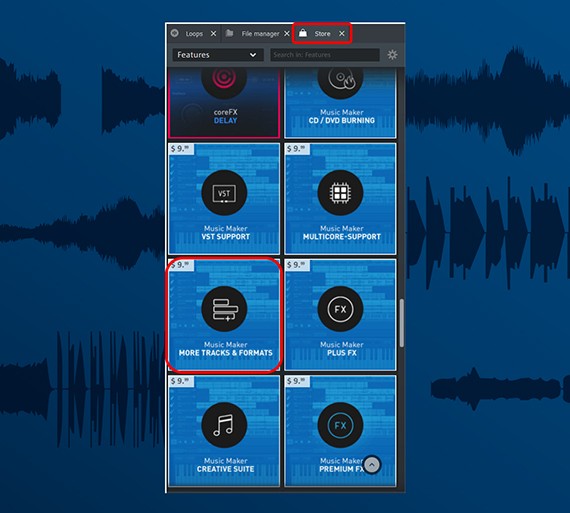
Installing the add-on module "More tracks and formats"
In order to edit MP3 files, they must first be converted to "normal" audio files. For that, you'll need the add-on pack "More tracks and formats" or a Music Maker Edition such as MUSIC MAKER Premium. Both can be purchased and activated directly in the program's in-app Store.
For the add-on, proceed as follows:
- Open the "Store" in the top right.
- Select the "Features" option from the dropdown menu.
- Search for "More tracks and formats" or scroll down the list of items.
- Click on the "More tracks and formats" tile to read more detailed information.
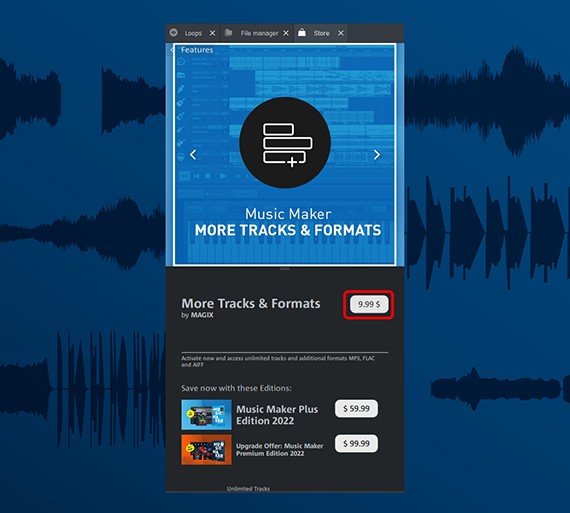
- Click on the price to to buy the add-on and follow the instructions.
Afterwards, in addition to the WAV, WMA and OGG export formats already included in Music Maker Free, you have unlimited access to the fee-based MP3 and FLAC encoders, as well. This means that you can now load and edit all MP3 files, as well as create them from other audio formats. Additionally, you now have an unlimited number of tracks in the project window.
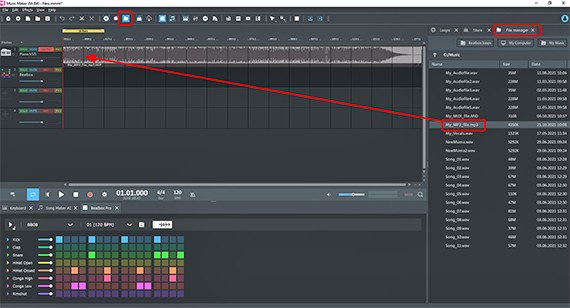
Importing and playing MP3 files
To load your own MP3 file, proceed as follows:
- Click the icon for the File manager in the upper toolbar. This will open the File manager on the right.
- Browse in the File manager to the folder where your MP3 files are saved.
- Drag the MP3 file to the left into the arranger by holding down the left mouse button (drag & drop). You can also import several MP3 files one after the other.
- If required, zoom in using the zoom buttons in the lower right so that you can see all the media in the arranger.
You can drag your MP3 files anywhere onto any track. In general, it makes the most sense to drag the first MP3 file directly to the beginning of track 1 and place all the others slightly behind it.
- Press the spacebar to play or pause playback.
- Click in the timeline to move the playback marker. This way you can quickly jump to different parts of the project.
Playback always occurs within the yellow range above the top track.
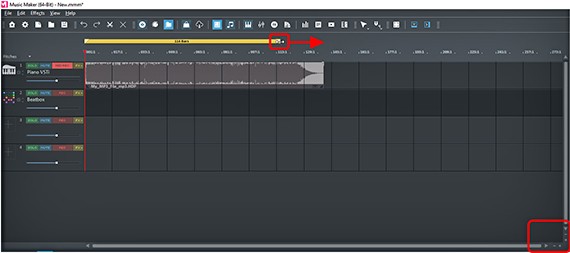
- To change the range, drag the ends of the bar to the left or right with the mouse. You can also move the ends with a simple click in the range bar: Left-clicking sets the start of the range, right-clicking sets the end of the range.
- The yellow playback range can also be shifted freely. To do this, click in the middle of the bar and drag the bar to the left or right over another section in the project, for example over another MP3 file, and adjust the ends of the range as needed.
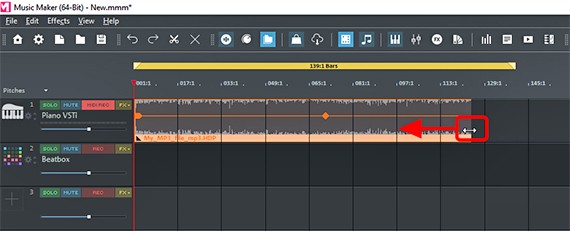
Shortening, splitting and cutting MP3 audio files
All MP3 files in the project can be shortened easily using the same method:
- Move the mouse pointer to the front or back edge of the object until the mouse pointer becomes a double arrow.
- Click and drag the object edge inwards.
This allows you to cut out the intro at the beginning and respectively outro at the end.
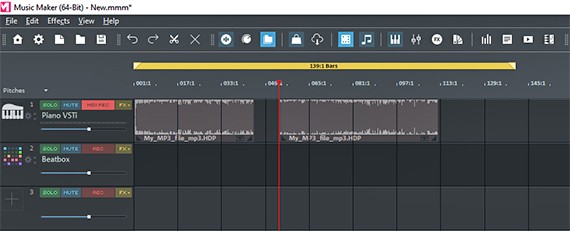
- To split an MP3 file in the middle, place the playback marker at the desired position for the cut and press the "T" key.
This cuts the object in the track into two separate objects.
To delete a certain section within an MP3 file, split the file once at the front and again at the back and then delete the unnecessary part with the Del key.
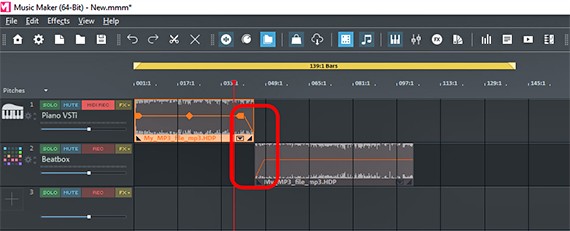
You can crossfade two objects into each other by applying a fade with the object handles:
- Move the rear object onto its own track below and drag it forward so that the start overlaps with the end of the first MP3 file.
- Click the object above to select it.
Now, handles will appear on the object.
- Drag the handle at the back object edge to the left. This will create a fade-out.
- Click the bottom object and drag its front handle to the right. This will create a fade-in.
Alternatively, you can merge the two objects on the same track. This will create a crossfade. However, it is possible to adjust the crossfade more precisely if the two objects are placed on two different tracks.
- Play the transition and listen to the result. If necessary, adjust the position of the objects on the tracks and the fade handles until the desired result is achieved.
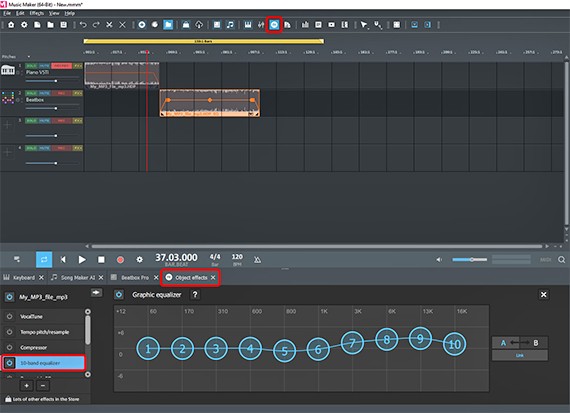
Editing and optimizing MP3 files
Perhaps your MP3 file could also benefit from a bit of sound optimization?
- Click on the FX button in the upper toolbar to open the Object effects
The object effects will appear in the lower area. They always apply to the selected object.
You can use the equalizer to give dull recordings more brightness and brilliance. Use the compressor to increase loudness and punch.
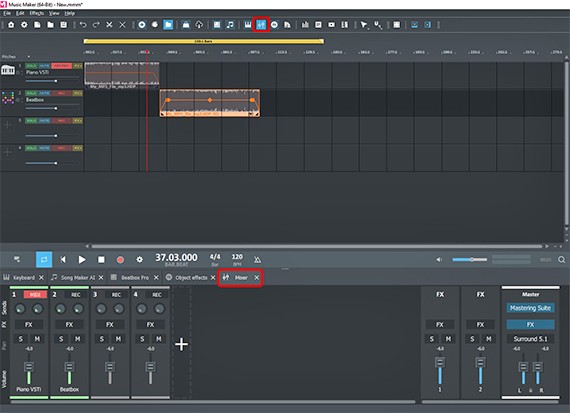
- Use the mixer to balance the volume of MP3s on different tracks. This can be opened by pressing the "M" key or the mixer icon in the toolbar.
You can find additional track effects for all the objects in a track and a mastering section for overall sound in the mixer as well.
Control the volume of each track using the volume faders on the respective mixer channels.
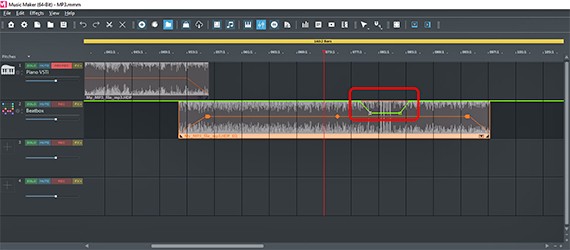
In some cases, you may want to reduce or increase the volume of certain parts of an MP3 file. This can be done using a volume curve.
- Right-click on an empty area and select "Display track curves" > "Volume".
- Zoom into the display if necessary and place curve handles by double-clicking on the volume curve.
- Drag the automation curve down using the curve handles.
To make a specified range louder, do the opposite and make all the other ranges quieter using the volume curve. This helps prevent clipping.
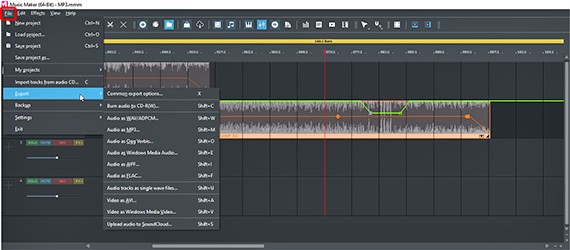
Editing and exporting MP3 files
Finally, when you are satisfied with your editing, sound and volume levels, you need to export your project. You have the choice between exporting the complete project from the first to the last object or only the current playback range.
If you only want to export a specific area, make sure that the playback range is exactly over the desired portion of the project. If you have several MP3 files, it is typically best to export the each MP3 file separately and adjust the export range accordingly.
To export, open the "File" menu and select an option from the "Export" submenu. The following audio formats are available for compressed files:
- Audio as MP3: This option creates MP3 files again, which contain all the cuts and editing made in the project.
- Audio as Ogg Vorbis: OGG is also common and has (almost) the same properties as MP3. The main advantage of this format is that it is available for free. That means this option is also available for use without the additional package "More tracks and formats".
- Audio as Windows Media Audio: WMA files are also free, this codec was developed by Microsoft and is included with your Windows operating system.
- Audio as FLAC: This format is the only, true lossless compression format (aside from WAV). This means it offers the highest sound quality. Even formats with quality loss, like MP3 and OGG, settings can be adjusted so that you don't notice any quality loss or artifacts in the sound. Like MP3, FLAC requires the purchase of the "More Tracks and Formats" add-on pack or a Music Maker Edition.
No matter the case, there is an export dialog where you can change the compression settings.
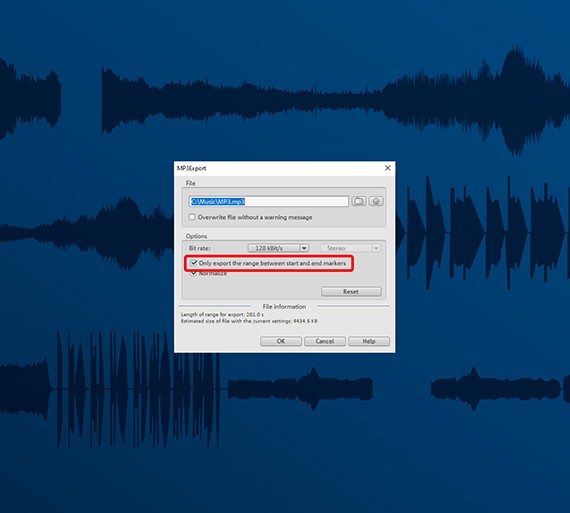
- If you only want to export the current playback range instead of the complete project, be sure to select the "Only export the area between the start and end markers" option in the export dialog.
- Click "OK" and select a target directory where you want to save your files.
This is where you will find your compressed files and then copy them to your smartphone, for example.







- Only now for free in this offer:
- iZotope Ozone 11 Elements (€ 55 value)
- Native Instruments Hybrid Keys (€ 49 value)








